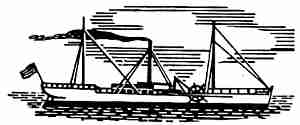|
|
|
11. Inventor - Business Man
A Radio Talk by Charles F. Kettering
On a warm August day
in 1807 a large
crowd of people lined the banks of the Hudson River not far from where
I am now speaking. They had been told they would see the first trip of
a boat without sails. And the skeptics, as usual, were there
laughing at the strange looking craft, and ridiculing the idea it
could move without sails or oars.
 But presently smoke began to pour from the stack and the catcalls and
ridicule changed to cheers as the weird looking boat moved slowly up
the river. Robert
Fulton, that day, successfully accomplished something
that Fate rarely permits an inventor to do - he proved his idea was
practical and at the same time opened up a large part of America
to pioneers and settlers.
But presently smoke began to pour from the stack and the catcalls and
ridicule changed to cheers as the weird looking boat moved slowly up
the river. Robert
Fulton, that day, successfully accomplished something
that Fate rarely permits an inventor to do - he proved his idea was
practical and at the same time opened up a large part of America
to pioneers and settlers.
Robert Fulton did not begin his career as an
inventor; very few men
ever do. Although in his youth in Lancaster, Pennsylvania he
exhibited considerable mechanical ingenuity, his ambition was
to become an artist like another Pennsylvanian, Benjamin West. West was
the great American painter who later became president of the Royal
Academy of England. So, at seventeen, Fulton went to Philadelphia to
study painting. Benjamin Franklin
helped him and very soon he
earned a reputation as a painter of portraits and landscapes. He
could also make excellent drawings of machinery, bridges and buildings.
|
|


 But presently smoke began to pour from the stack and the catcalls and
ridicule changed to cheers as the weird looking boat moved slowly up
the river.
But presently smoke began to pour from the stack and the catcalls and
ridicule changed to cheers as the weird looking boat moved slowly up
the river. 





